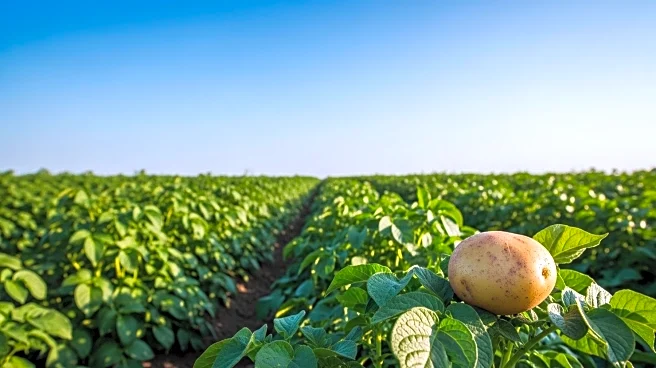What is the story about?
What's Happening?
The potato protein market is experiencing significant growth, driven by increasing consumer demand for healthier and more sustainable food options. Potato protein, traditionally used for animal feed, is now being recognized for its high digestibility and amino acid profile, making it suitable for sports nutrition and active aging. Market intelligence firm Mordor Intelligence predicts a compound annual growth rate (CAGR) of 6.05% for potato protein between 2025 and 2030. This growth is supported by its strong functionality in food applications, such as foaming, emulsifying, and gelling, which allows formulators to reduce eggs and stabilize emulsions in plant-based products. Additionally, potato protein is allergen-free, making it appealing in a market where allergies are on the rise.
Why It's Important?
The expansion of the potato protein market is significant for several reasons. It offers a viable alternative to traditional animal proteins, which are often considered higher quality. However, potato protein has been shown to match the quality of pork meat, egg, and casein, according to the Digestible Indispensable Amino Acid Score (DIAAS). This positions potato protein as a strong contender in the plant-based protein market, appealing to consumers seeking nutrition without allergens like lactose or gluten. The market's growth also reflects broader trends towards plant-based diets and sustainability, as potato protein valorizes a side-stream from the potato industry, enhancing its sustainability credentials.
What's Next?
As the market for potato protein continues to evolve, its nutritional evidence supporting muscle building and recovery-oriented products will likely drive further growth. The shift towards food-grade potato protein is expected to gain momentum, with increased focus on clean labels and processing tolerance. The market may also benefit from the rebound of the plant-based category and the scaling of hybrid meat products. Stakeholders in the food industry, including manufacturers and formulators, are likely to continue exploring the potential of potato protein in various applications, further solidifying its place in the market.
Beyond the Headlines
The rise of potato protein highlights ethical and environmental considerations in food production. Its allergen-free nature addresses growing concerns about food allergies, while its sustainability credentials align with consumer demand for environmentally friendly products. The market's growth may also influence cultural shifts towards plant-based diets, emphasizing the importance of protein quality and functionality in food choices.
















